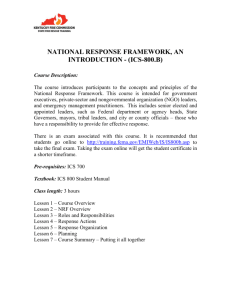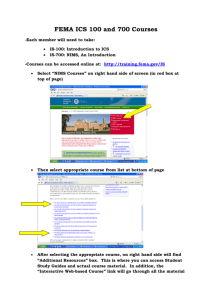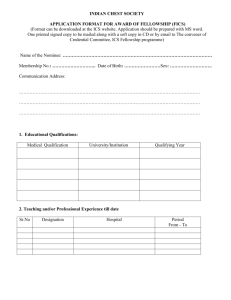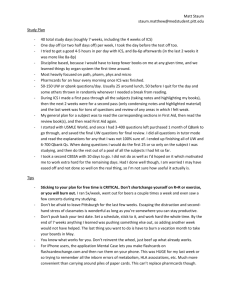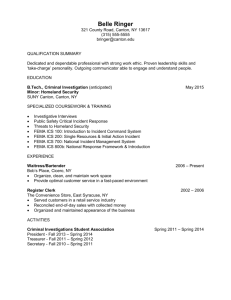Enhancing Capacity For Disaster Response In India Integrating the Incident Command System
advertisement
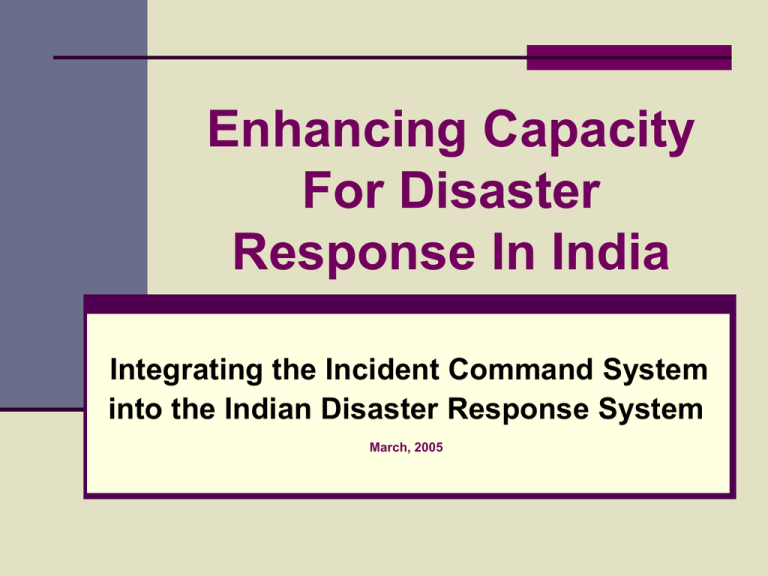
Enhancing Capacity For Disaster Response In India Integrating the Incident Command System into the Indian Disaster Response System March, 2005 Overview of Presentation Indian Disaster Management Context Overview Program Background Program Phases Phase 1: Developing the Framework for Change Phase 2: Training Phase 3: Implementation GOI Actions to Integrate ICS Disaster Management Program/IP India is one of the most hazardprone countries in South Asia Indian Context Recurring landslides, floods, drought High seismic risk Frequent cyclones Orissa Super Cyclone – 1999 Indian Context Over 1.8 10,000 people killed million homes damaged/ destroyed $1.5 billion damages Indian Context Gujarat Earthquake - 2001 20,000 killed 600,000 homeless 15.8 million affected Infrastructure damage of $453 million Drought in 2002 - 2003 Indian Context 14 states affected, 40 million in Rajasthan 3% decline in agricultural production GDP growth rate reduced Millions spent on relief programs Government Actions Indian Context High Powered Committee chartered in 1999 Improve disaster response Recommend actions Expand Scope of Disaster Management Change in responsibilities Ministry of Agriculture to Home Affairs Include disaster preparedness & mitigation Program Background Program Background ICS recommended as “culture of quick response” in HPC report (2001) Introduction to ICS presentations (2002) OFDA funded ICS program (2002) USAID/India funded ICS program (2002) One of five components in DMS strategy Phase I: Framework Phase 1 The Framework for Change Linkage with Ministry of Home Affairs (MHA) as nodal institution (October, 2002) Orientation to ICS and supporting systems for decision makers (October, 2002) Brainstorming Workshop (March, 2003) Phase I: Framework The Framework for Change Consultations with key MHA decision makers (April, 2003) LBSNAA Centre for Disaster Management established/funded (September, 2003) Phase I: Framework The Framework for Change U.S. Hosted Study Tour on Disaster Management (August, 2003) Phase I: Framework Technical Outputs 1. Framework to integrate ICS into Indian disaster management system 2. Training, rank, and certification standards 3. Standard operating procedures: 4. Delegation of authority Activation of ICS and Special ICS Teams Team Staffing Nation-wide plan to institutionalize ICS training through a train-the-trainer process Phase I: Framework GOI Products Nationwide TOT plan US cadre/LBS to train core group 12 core trainers per state 20,000+ ultimately trained MHA ICS Directive disseminated to states (July, 2004) Phase I: Framework Adaptations Indian vs. U.S. Context Role of rank and performance in ICS positions Quantity/standard of disaster response resources Vulnerability of population Relative scale of relief to victims NGOs, CBOs, volunteers as resources Type/relative importance of disasters (all risk) TOT model Trained instructor vs. experienced practitioner Phase I: Framework India ICS Components Incident Command System Incident Response Coordination System Institutionalization Incident Command Teams Training Specialized Tactical Resources Certification & Qualifications Publications Phase I: Framework District Level Teams District Incident Command Teams District Headquarters Team On-scene deployment General coordination Focus on operational Distribution of relief aspects of response Members carefully selected from District Time-bound mobilization State can deploy to other Districts materials Media management VVIP visits Overall logistics Sample Expanded District Incident Management Team District Incident Commander* Deputy Incident Commander Phase I: Framework Information Officer* Liaison Officer* Safety Officer* Planning* Logistics* Situation Unit Supply Unit Resource Unit Communications Unit Documentation Unit Food Unit Demobilization Unit Medical Unit Facilities Unit Ground Support Unit Operations* Finance/ Administration* Procurement Unit Functional/Geog. Branch Director Functional/Geog. Divisions/Groups Functional/Geog. Branch Director Functional/Geog. Divisions/Groups Water/ Sanitation Group Health Group Air Operations Group Search and Rescue Group Corpse Disposal Group Evacuation Group Shelter Group Other Specialized Operations Group Sample Expanded District Headquarters Team District Incident Commander* Phase I: Framework Deputy Incident Commander Information Officer* Liaison Officer* Safety Officer* Contact for NGOs & Foreign Teams Planning* Situation Unit Resource Unit Logistics* Receiving & Distribution Ctrs Mobilization Air Operations Communications Centre Health Unit Water/ Sanitation Unit Transportation Unit Donations Unit Food Unit Supply Unit Equipment Unit Other Line Depts As Needed Finance/ Administration* Procurement Unit Cost Unit Phase I: Framework State Level Teams On-Scene State Incident Command Teams Highly trained and specialized Hold positions above District Magistrate 2-hour mobilization Deployed by State Chief Secretary State Headquarters Team Support DM Secretary Overall planning, logistics and coordination Mobilization Air Operations Finance/Admin Phase I: Framework National Level Response Headquarters team to support Central Relief Commissioner Sets objectives and strategies Mobilizes resources at national level Coordinates international assistance and Inter-State issues Phase 2: Training Curriculum for Core ICS Trainers Basic/Intermediate ICS Advanced ICS Planning Section Chief Area Command Situation Unit Leader Resource Unit Leader Demobilization Unit Leader Documentation Unit Leader Finance/Admin Section Chief Logistics Section Chief Operations Section Chief Incident Commander Creating & Conducting Disaster Simulation Exercises U.S. Hosted Study Tours/ Shadowing ICS Teams Study aid packages provided for lower level courses Adaptation provided as needed Phase 2: Training Course Adaptation Process 1. U.S. cadre meeting (US) 2. U.S. cadre instruct course to Indian “National Core Group” (India) 3. U.S. cadre/India Core Group adapt and revise course materials (India) 4. U.S. cadre observes course offerings conducted by Indian instructors (India) Phase 2: Training Basic/Intermediate ICS 01/04 Phase 2: Training Plans Section Courses 03/04 Phase 2: Training Finance/Admin Section Chief Phase 2: Training Logistics Section Chief Phase 2: Training Operations Section Chief Phase 2: Training Incident Commander Other Activities Phase 2: Training U.S. Study Tours August, 2003, and June, August, 2004 Future Courses Phase 2: Training Study Tours on Disaster Management in the US June and August, 2005, 2006 Advanced ICS – January, 2006 Creating and Conducting Disaster Simulation Exercises – February, 2006 Evaluation Workshop – February, 2006 Area Command (4 Observer slots) February, 2007 Phase 3: Implementation Phase 3 Implementation Brainstorming workshop – operationalizing ICS Develop “Standard Operating Procedures” manual Develop ICS suite of software Simulation exercises - all government levels Mobilization planning Linkages with other USAID DMS components FEMA: EOCs NOAA/NWS: Early warning systems USFS consultation/assistance/course observation Use of ICS for planned events, mock drills Adaptation of Planning Section Chief course Phase 3: Implementation ICS Program Oversight USAID/India Disaster Management Strategy steering committee Gender mainstreaming review Periodic Evaluation/Feedback Workshops USFS solicits feedback after each activity USFS periodically observe ICS courses in India Evaluation workshop after training curriculum Conduct workshop after completion of program Phase 3: Implementation Role of LBSNAA “Centre for Disaster Management” Training counterpart for USFS “Center of Excellence” for ICS expertise in India Standardization and quality control of ICS courses Phase 3: Implementation Role of LBSNAA “Centre for Disaster Management” Responsible for national TOT training plan Trainee database system for ICS courses Database system for certification of positions qualifications GOI Activities to Date Integrating ICS GOI Activities Basic/Intermediate ICS March 2004 (U.S. observers) July 2004 August 2004 Ongoing ICS Overview courses IAS Officers State Police Services ASEAN Inception Workshop May, 2004 GOI Activities Integrating ICS GOI Activities Earthquake response mock drill using ICS New Delhi: August, 2004 Use of ICS for cultural festival in Sikkim Courses begin at six regional ICS training centers: December, 2004 GOI Activities Integrating ICS GOI Activities Yashada Institute Journal article on ICS in Marathi: October, 2004 Study of potential use of ICS during tsunami response: January, 2005 Future DMP Activities Future Activities ASEAN Program Sri Lanka Food and Agriculture Organization Hosted study tours in the U.S. GSA – COOP and COG Questions
